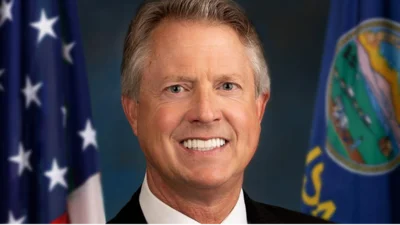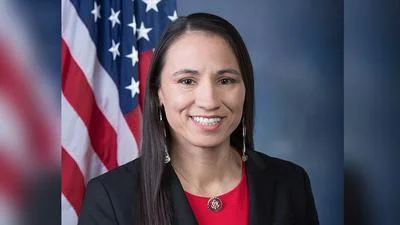Representative Sharice Davids | Representative Sharice Davids Official Website (https://davids.house.gov)
Representative Sharice Davids | Representative Sharice Davids Official Website (https://davids.house.gov)
On April 26, 2023, Rep. Sharice Davids voted against a partisan plan that would gut critical support for hardworking families across Kansas while delivering tax breaks for the top 1 percent and big corporations. If signed into law, the effects on our country’s future would be disastrous, costing 780,000 jobs nationally and reversing recent economic growth, according to Moody's Analytics.
“I’m willing to work with anyone when it benefits Kansas, but that’s not what this partisan proposal does. It cuts support for local law enforcement and decimates programs Kansans rely on—seniors would struggle accessing Social Security and Medicare benefits, veterans would face longer wait times for the health care they’ve earned, and families would pay higher prices for their monthly utilities,” said Davids. “If folks in Washington keep playing political games and risking default, there could be drastic consequences for Kansans, who would see their retirement savings go down and their mortgages go up. I agree we need to protect taxpayers and stop wasteful spending, but threatening a national default is not an appropriate negotiating tactic.”
Specifically, the proposal would affect programs Kansas seniors, veterans, and families rely on and reduce our country’s ability to keep Kansans safe, healthy, and employed.
Kansas Seniors
Increased Wait Times: Seniors would face increased wait times when they call for assistance for both Social Security and Medicare due to staffing cuts.
What this means: This affects 611,400 Kansas seniors who depend upon Social Security and Medicare.
Closed Offices: Hundreds of Social Security field offices could be forced to close or shorten hours of operation.
What this means: Kansans applying for disability benefits would wait an additional 2 months for their claims to be processed.
Kansas Veterans
Fewer Health Care Visits: The Veterans Health Administration (VHA) would provide 13 million fewer visits and eliminate more than 6,000 staff nationally.
What this means: There would be 64,700 fewer veteran outpatient visits in Kansas, forcing Veterans to wait longer for the benefits they’ve earned.
Decreased Telehealth Services: Veterans Affairs (VA) would limit video-to-home telehealth services because of reduced funding for necessary IT infrastructure and support.
Kansas Families
Increased Utility Costs: Recently passed clean energy tax credits that lower utility costs for families would be rolled back.
What this means: These tax credits save Kansas families an average of $500 per year on their utilities.
Reduced Early Education Opportunities: Head Start programs, which increase graduation rates and improve behavioral development, would be slashed.
What this means: 2,500 preschool and child care slots in Kansas would be eliminated.
Additional Effects:
Public safety: Eliminates the jobs of 400 local law enforcement officers and cuts federal support to 60 local law enforcement agencies.
National Security: Undermines Customs and Border Protection’s ability to secure the border and combat drug trafficking through decreased air and sea detection practices, equaling 859 pounds of fentanyl not seized at the border.
Workforce: Denies 750,000 American workers job training and results in 100,000 fewer workers participating in a registered apprenticeship.
Infrastructure: Reduces rail safety through 140 fewer safety inspections in Kansas annually and 30,000 fewer miles of track inspected nationally.
Agriculture: Cuts tax credits that increase the production of low-emissions transportation fuel, which is produced domestically with the help of Kansas farmers.
Nutrition: Leaves 1.5 million Americans at risk of experiencing hunger due to decreased access to Special Supplemental Nutrition Program for Women, Infants, and Children (WIC).
Additionally, Davids has advocated for a longer-term solution to avoiding default on the national debt. A default would have disastrous consequences for everyday Kansans from mortgages and retirement savings to veterans’ and Social Security benefits to small business loans and consumer good costs. In Kansas’ Third District, it would eliminate 7,800 jobs, increase lifetime mortgage rates by as much as $80,400, and slash $20,000 in 401(k) retirement savings for 92,500 Kansans.
Sources used to compile the above information include the Joint Economic Committee, Moody’s Analytics, Third Way, the House Committee on Appropriations, the White House, and the U.S. Department of Veterans Affairs.
Original source can be found here.






 Alerts Sign-up
Alerts Sign-up